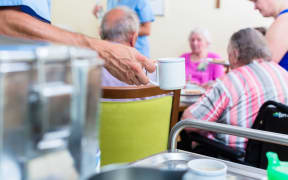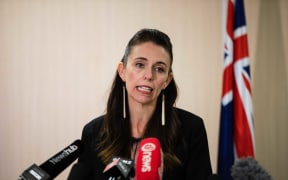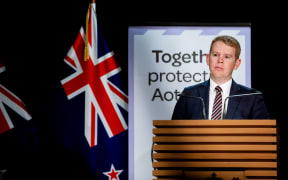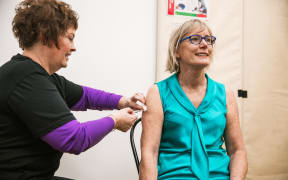From Monday unvaccinated managed isolation workers will start being moved to low-risk roles - yet health authorities can't be sure which workers haven't had the jab.
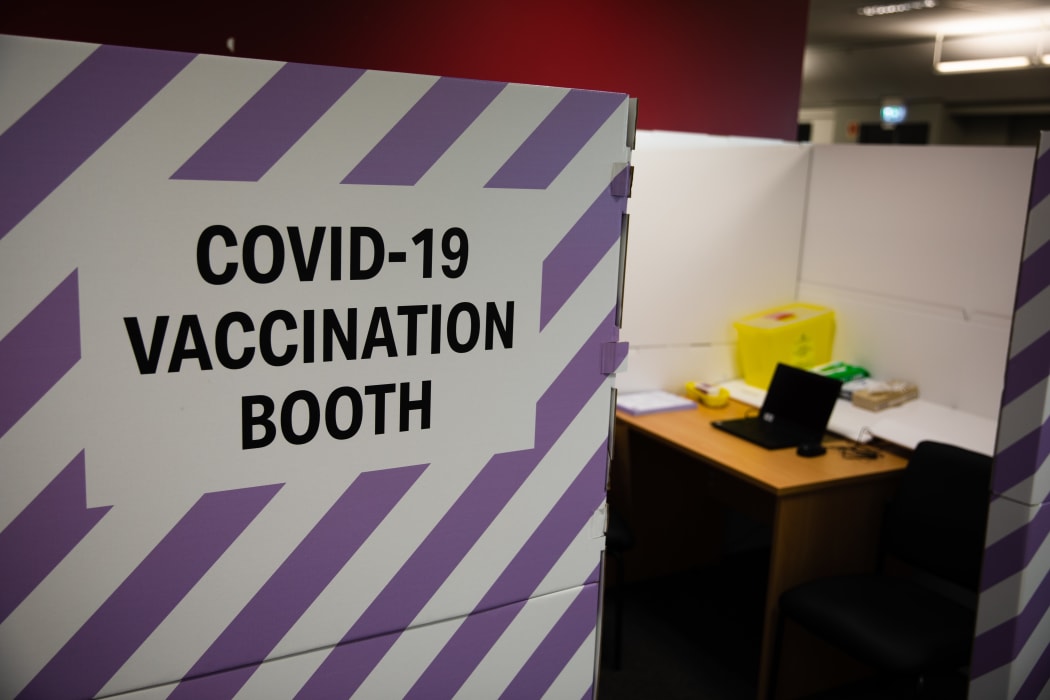
The new Covid 19 vaccination facility in South Auckland Photo: RNZ / Simon Rogers
Uptake by MIQ staff is described as strong, although the government says a "small proportion" have not been vaccinated and some people may decide not share their vaccination status with their employer.
A security guard at the Grand Millennium Hotel tested positive for Covid-19 and it transpired he had missed two vaccine appointments for "personal reasons."
The Ministry of Health launched an audit of the Grand Millennium Hotel, doubled the testing frequency for staff there and in a statement said the majority of the worker's colleagues have had the jab.
"We know that the company employing this case has vaccinated 79 percent of its MIF workers and 81 percent of the Grand Millennium staff have received their first vaccination," it said.
This is a notably lower estimate than the one provided by Covid-19 Response Minister Chris Hipkins on 23 March. Speaking to media about vaccination rates, he said "the feedback we've had from the hotel management at the Grand Millennium is that they're well above 90 percent."
Yesterday, Director-General of Health Dr Ashley Bloomfield said between 90 and 95 percent of the country's managed isolation workers had had the vaccine.
However asked the same question just a few hours later, the Ministry of Business Innovation and Employment said "around 85 percent of MIQ workers have had their first dose and about 50 percent have had their second."
Speaking to Morning Report, Hipkins could not put an exact figure on the number of border workers but said it was between 15,000 - 20,000.
He said the government is working through a process of removing workers who haven't been vaccinated from frontline roles.
Hipkins added it is complicated working out who has been vaccinated and who has not.
"There's a degree of complexity here, they have to work their way through a process, so they have to do the vaccinations, but then the data reconcilliation is a manual process, so you actually have to go through each employer, the list of all their employees, identify [if] these people are still even working there, have they been moved to other duties if they've turned down a vaccination ... that's the process we've been doing over the past couple of weeks and we've still got a little way to go.
"In the event that there are people still working there that haven't been vaccinated, there is an employment process that they have to go through, they have to follow employment law the same as everybody else does."
Hipkins said that new border workers would be offered the opportunity to be vaccinated before they start their role.
John Crocker, the national secretary of Unite Union which represents MIQ workers, said he would like specific numbers.
"I don't see any reason why they shouldn't have that information public. I think it's good for the other workers to see that the uptake is there and I think it's good to have the public reassured that this front-line of defence is getting stronger," he said.
Neither Bloomfield, the Ministry of Health nor the Ministry of Business, Innovation and Employment (MBIE) have been able to say exactly how many people working in MIQ hotels have not had a jab.
Data on vaccines is recorded by individual MIQ hotels and MBIE noted some workers had decided "not to share their vaccination status with their employers."
This comes as the government plans to crack down on unvaccinated border workers, including MIQ staff.
Prime Minister Jacinda Ardern said it was becoming too risky to leave them in jobs where they might contract Covid-19 so from Monday they will start to be moved into "low risk" roles.
E tū union also represents border workers and organiser Mat Danaher said any job changes needed to be thoroughly considered with a "cross-agency, cross-employer approach."
"First of all a risk assessment should be carried out to determine whether the work is indeed of a high risk.
"For instance looking at MIQ ... all the work is probably high risk. Elsewhere across the border there'll be a mixture of risk.
"Our view is very much that anyone who can't be vaccinated is redeployed, and doesn't suffer any detriment as a result of not being vaccinated, because obviously there's a lot of reasons why people can't be."
Nurses Society director David Wills believed any new staff in the MIQ hotels should have their vaccination status checked.
"In a number of areas, and in fact we're seeing this across the health service now, some employment agreements are being very clear that a condition of employment is to be vaccinated.
"That's happening, for instance, in the aged care sector," he said.
MBIE said by next month "all work in MIQ facilities will be carried out by vaccinated workers."
In a statement it said employers had obligations under the Health and Safety at Work Act 2015 to take all reasonable, practicable steps to eliminate or control "known risks".
"This includes obligations to employees working at the border at this time, who have a high risk due to Covid-19," the statement said.
"MBIE provided guidance to MIQ employers from 23 March 2021 which supported them to start individual conversations with their staff about the importance of being vaccinated."

